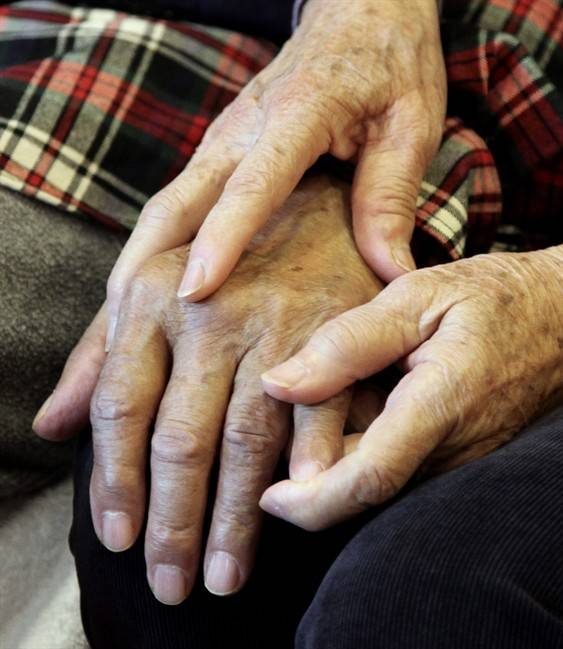TORONTO – British doctors will be screening middle-aged patients in England so they’ll know where their “brain age” stands, a measure that officials are hoping will force people into living a healthier lifestyle.

Residents in their 40s and older could be screened with a computer-based test that’s now in its pilot stages. If it’s successful, it could be rolled out to doctors’ offices across the country, according to Public Health England.
During routine health checks, a patient could be told that their brain is 20 years older than the rest of his or her body. The prognosis could “scare” people into losing weight, exercising more or making better choices when it comes to meal-time, the Daily Telegraph reported.
READ MORE: What are the early warning signs and symptoms of dementia?
This week, Dr. Charles Aleesi, PHE’s lead on dementia, will present the screening tool to a G7 convention on dementia in Tokyo, the newspaper said.
“Dementia is going through a phase where people are very scared of it – but you can use the fact they are willing to change their behaviour because they are scared of it…to make that change take place,” Aleesi told reporters.
“The tool compares the rate of the brain aging compared to the actual age of the individual. We would have something that would assist people in managing their own behaviour.”
The test is based on questions about patients’ habits when it comes to working out, alcohol consumption, smoking status and weight. These are all critical factors when it comes to dementia, but also heart disease, diabetes and high blood pressure among other chronic conditions.
- Buzz kill? Gen Z less interested in coffee than older Canadians, survey shows
- Naloxone-resistant street drug linked to 9 deaths in Eastern Canada seized in Alberta
- Bird flu risk to humans an ‘enormous concern,’ WHO says. Here’s what to know
- ‘She gets to be 10’: Ontario child’s heart donated to girl the same age
This is exactly what Alzheimer’s Disease International, an organization also rooted in the U.K., warned of in its 2014 annual report.
READ MORE: Inside the world of dementia, as a painful reality sets in
Last year, it warned that the world is “woefully unprepared” for a rising dementia epidemic. The numbers were staggering: by 2050, about 135 million people worldwide would be living with dementia.
This year in its sixth annual report, ADI pushed aside projections and estimates and zeroed in on how everyday people can keep dementia away. While it’s a disease in the brain, it shares similar risk factors as heart disease and other chronic conditions.
READ MORE: What Alzheimer’s disease and heart health, diabetes have in common
“From a public health perspective, it is important to note that most risk factors for dementia overlap with those for other major non-communicable diseases,” Marc Wortmann, ADI’s executive director, said.
“The takeaway here is that there are things you can do to increase your brain health and those are the same things that are good for your heart,” Wortmann told Global News from London, England, in September.
READ MORE: Blog – Dealing with dementia in your family
Diabetes can increase the risk of dementia by 50 per cent. Obesity and lack of physical exercise are also important risk factors for diabetes and high blood pressure. In turn, they’re also risk factors for dementia.
Take up regular exercise, follow a healthy diet and quit smoking, the report suggested.
READ MORE: ‘Woefully unprepared’ for world dementia epidemic, report warns
Critics call the brain age testing “heavy-handed and intrusive” and suggest that the screening might even scare patients away from booking a check up.
“Not only could this frighten people, on the basis of spurious forecasts, but this sort of approach could put people off seeking help from their GP when they need it,” Roger Goss, of Patient Concern, told the Daily Mail.
About 747,000 Canadians already have Alzheimer’s disease and other forms of dementia – that’s expected to double to 1.4 million in less than 20 years.
READ MORE: Brain exercise trumps medication in maintaining seniors’ cognitive health: study
Alzheimer’s is the most common type of dementia. It affects memory, thinking and behaviour.
It’s also one of the most costly illnesses that global healthcare officials have had to deal with. A U.S. report suggests it tops cancer and heart disease, costing families and society $157 billion to $215 billion a year.
READ MORE: Alzheimer’s most costly malady in US topping cancer, heart disease: study
The biggest cost isn’t drugs or medical treatment, it’s the care that mentally impaired people need through daily life.
carmen.chai@globalnews.ca
Follow @Carmen_Chai



Comments